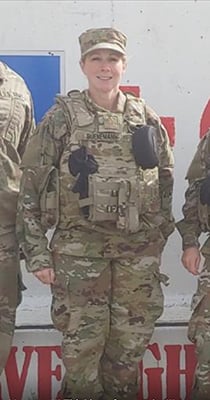As far as her nursing passion is concerned, Margaret Buenemann’s life began in her 40s when she was commissioned as a U.S. Army Reserve nurse.
“I came to the military late in life,” she says. “When you are older, you are a little more aware of your surroundings versus when you were younger.”

Margaret Bunemann in uniform as an active reservist |
As a healthcare veteran currently residing in Washington state, Buenemann has worked in the field for 23 years with 10 years in critical care. As a military veteran, she was deployed to Kuwait for nine months between 2019 and 2020.
The deployment profoundly changed Buenemann’s perspective. It also made her eligible for a military benefit that covers 60% of tuition.
“I wanted to get my master’s degree, but I didn’t know what I would pursue,” she says. “Sometimes when you get a higher degree, you leave bedside nursing. I didn’t want to leave bedside nursing.”
While working for the post-anesthesia care unit at Kaiser Permanente in Portland, Ore., Buenemann found a home for her dual interests at the University of Colorado College of Nursing’s Veterans and Military Health Care program. She focused on women in the military and the effects of toxins like Agent Orange on soldiers. When she graduates in December, she’ll have an MSN specializing in Veterans and Military Healthcare.
“As reservists, we don’t see the patient population per se because it’s only one weekend a month, but everything I’ve learned is applicable to my soldiers during my army reservist weekends, active-duty time, and summer missions,” she says.
“Certain nurses think they know it all and after 20 years of nursing. I’m amazed at how much I don’t know… If you aren’t aware that you have a blind side, how can you continue to improve?”
– CU Nursing Military and Veteran Health Care Student Margaret Buenemann, BSN, RN
Applying what she’s learned
Buenemann says she’ll use her newly acquired skills simply to become a more versatile nurse.
“I want the experience of this particular degree because I truly think it’s beneficial,” she says. “Certain nurses think they know it all and after 20 years of nursing. I’m amazed at how much I don’t know. If you are open to being aware of that blind side, there’s continual practice changes and interventions based on the evidence. If you aren’t aware that you have a blind side, how can you continue to improve?”
Buenemann offers this advice for future students:
“Take it all in and learn as much as you can and focus on how you are going to use it toward your own practice,” she says. “To me, it didn’t feel like school or learning that I had to do. I just found it useful for my practice.”



